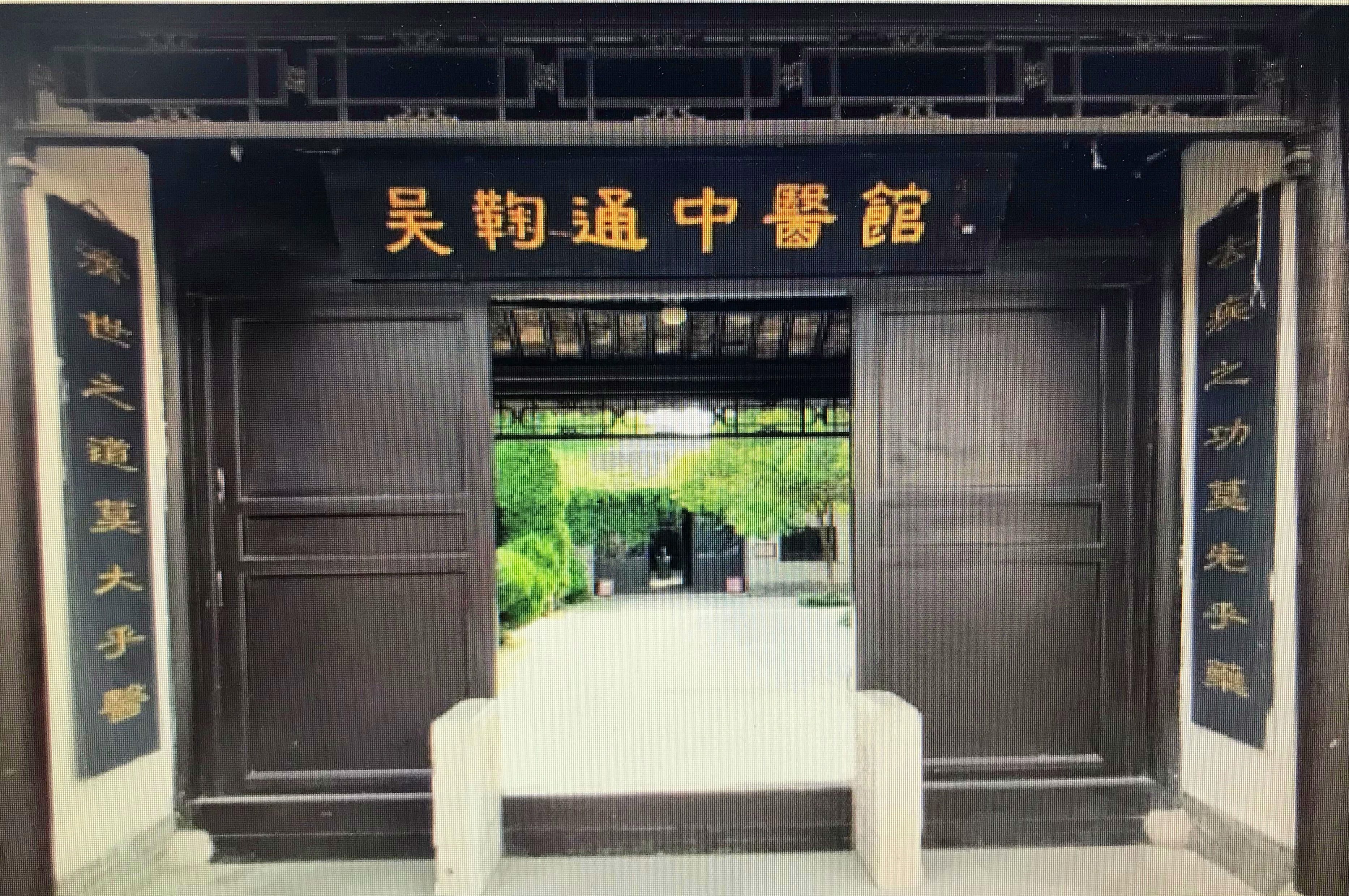I have been to the ancient town under the Huai'an River twice. The ancient town under the Huai'an River has produced a famous TCM master with a history - Wu Jutong. In the ancient town, there is the Wu Ju Tong Chinese Medicine Hall.

On both sides of the door of wu jutong Chinese medicine hall, there is a couplet: "The work of going to the disease is not the first medicine, and the way of the world is greater than the medicine", which shows the way of the world and the method of disease removal in Chinese medicine.
In 2018, on the occasion of our 40th anniversary of enrollment, the students gathered in Huai'an and visited the Wu Jutong Chinese Medicine Hall in the ancient town of Hexia on the 10-05th.
Wu Jutong was born in Huai'an City to a scholarly family. Father Wu Shourang, Zi Sunfu, Qianlong Xin Wei (1761) Xiu Cai (Huaishan Gong Yalu).
Huai Shun Tang
When he was 19 years old, Wu Jutong's father died of illness, so he abandoned Confucianism to study medicine. Later, he was selected as a deputy gong to enter Beijing and participated in the copying and proofreading of the medical book part of the "Four Libraries".
He was deeply inspired by Wu Youke's "Theory of Wen Epidemic", and also studied the various schools of thought after the Jin and Tang Dynasties, and his income was not shallow, and he made great progress in medical knowledge.
In the fifty-eighth year of Qianlong (1793), the Epidemic of Kyoto, many patients died due to improper treatment, Wu Jutong used Ye Tianshi's method to rescue and rescue dozens of patients, and his reputation was greatly enhanced.
Wu Jutong did not succeed in studying medicine at that time, and he was deeply distressed, and later, Wu Jutong studied hard, studied medicine, and finally became a Wen Disease Everyone, which was the highest achievement of the Wen Disease School.
Wu Jutong's contribution to traditional Chinese medicine lies in the innovation and theoretical improvement of chinese medicine legislation, especially for the treatment of warm diseases, which is the highest achievement of the Wen Disease School. His book "Identification of Wen Diseases" is one of the four classic works of Chinese medicine.
Couplets created under the name of Traditional Chinese medicine: chrysanthemum safflower honeysuckle blossoms in Huaxia, lilac fennel guangmu incense scatter Shenzhou. In the courtyard of the Chinese Medicine Hall, you can feel the atmosphere of Chinese medicine and the atmosphere of Chinese medicine everywhere.
The Qingxin Hall is the main hall of the medical hall and is located in the center of the medical hall. In the middle of the Qingxin Hall hangs a portrait of Wu Jutong and the Yang Lian of "with ancient and modern knowledge and art, abandoning the world to see merit is God", which summarizes Wu Ju Tong's ancient and modern knowledge, and can abandon the influence of secular medicine.
Wu Jutong took the salvation of the world as his own responsibility all his life, and he believed that no matter how he was practicing medicine, he must be worthy of his conscience and have a clear conscience, so no matter where he lived in his life, he named the main hall house "Qingxin Hall".
Jiehuatang
Jiehua is another ancient name for chrysanthemums, ancient poems say "not the flowers prefer chrysanthemums, this flower is more flowerless after blooming"; Ouyang Xiu of the Song Dynasty also called chrysanthemums "flowers when the grass is destroyed". Wu Jutong's "ju" and the ancient text "chrysanthemum" are similar, and it is said that Wu Jutong also liked chrysanthemums very much during his lifetime. On both sides of the foyer hangs a couplet, "Upholding the Philosophy of Transcendence, With the Heart of Salvation", which was written by Wang Tingzhen, the chancellor of the Daoguang Emperor, for Wu Jutong, and highly praised his character and intelligence.
Jiehuatang displays different editions of academic works such as "Identification of Wen Diseases", "Medical And Medical Disease Books", and "Wu Jutong Medical Cases".
In the "Wen Disease Article Discernment", Wu Jutong left many excellent practical prescriptions for posterity, such as silver warp powder, mulberry drink, Huoxiang Zhengqi dispersion, Qingying soup, Qinggong soup, rhinoceros ground yellow soup, etc., which are extremely commonly used by later generations of physicians.
Hui Ying Tang
"Huiying Hall", here is a special exhibition hall introducing the Shanyang medical school, in Jiangsu in the treatment of Wen disease, it is called "South Menghe, North Shanyang". Beishan Yang refers to the Wu Jutong School.
The medical collection hall is mainly an introduction to the popular science knowledge of traditional Chinese medicine.
Save the lives of the wounded and live forever, and eliminate the plague and grow old in Changchun
The "back garden" is actually a medicine garden, which is planted with some Chinese herbs, and the strong medicinal fragrance is refreshing.
The medicine began shennong xingan to go to pain, and the doctor Chengju treated rejuvenation through diagnosis and treatment
After seeing Wu Jutong Chinese Medicine Hall, my heart fluctuated. Although Chinese medicine originated in China, but now does not lead the world, in the theory of Chinese medicine and the research and development of traditional Chinese medicine, there is an urgent need to catch up, sincerely wish the motherland medicine flourishing, for the Chinese people and even the world people to relieve the suffering of the contribution.